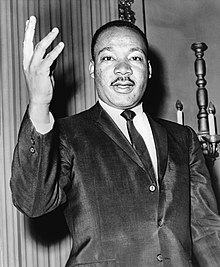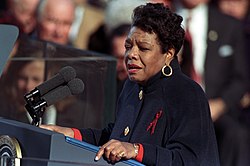Maya Angelou's lyrics
Maya Angelou is an African American writer best known for her seven autobiographies. But she was also a successful author of a large number of poems. She was called the " poeta laureatus of black women", her poems "Hymns of the African American".
Life
Angelou was interested in poetry from a young age, and literature as a whole was important to her in order to cope with the traumatic experiences she described in her first autobiography, I Know Why the Caged Bird Sings . After a number of activities as a young adult she developed into a poet, which included participating in a European tour of Porgy and Bess as well as performing calypso music in the nightclubs of the 1950s. Many of the songs she wrote at the time were later found in her anthologies and collections. She eventually gave up her career as a performing artist for writing.
Although she saw herself as a poet and playwright, she achieved worldwide recognition with her first autobiography, Caged Bird, in 1969 . Her first collection of poetry, Just Give Me a Cool Drink of Water 'fore I Diiie (1971), was nominated for the Pulitzer Prize . In 1993 she read one of her most famous poems for the inauguration of Bill Clinton: On the Pulse of Morning .
Angelou deals with the same themes in all of her writings: love, painful loss, discrimination, racism, and the struggles of life. Her lyrics are not easy to classify, they have been compared to musical styles and forms, especially the blues . Like the singers of this style, Angelou copes with less intense forms of anger, sadness and suffering through laughter or mockery rather than through tears, for example in Still I Rise , I Know Why The Caged Bird Sings and in the Million Man March Poem , both by Love and overcoming relationship problems. The metaphor of her poems, especially the litotes , is partly a code that blacks especially understand, but Angelous themes and guiding principles appeal to all people regardless of race. Angelou uses everyday language, the colloquial or vernacular language of blacks, their music and forms of expression, rhetorical techniques such as shocking language, the occasional use of swear words and a traditionally unaccepted topic. As in all of her autobiographies, Angelou speaks not just for herself, but for her gender and race. Her poems express the same moderate protest and struggles for survival as her autobiographies, conveying hope through humor. Closely related to the theme of racism is her portrayal of the struggle and oppression of her race.
background
Maya Angelou began studying poetry when she was growing up in Stamps , Arkansas, the location of her first autobiography, I Know Why the Caged Bird Sings (1969). She was raped at the age of eight, a traumatic experience that she portrays in Caged Bird . She tried to cope with this trauma by memorizing and reciting great works of literature. This, according to her own admission, helped her to overcome her self-imposed silence. The literary scholar Yasmin Y. DeGout sees literature as the medium that influenced Angelou's poetic sensitivity, especially the “liberating discourse that should develop in her own poetic canon”.
As a teenager, Angelou, who was originally called Rita Johnsohn, took up various activities as a singer, dancer and performing artist, with little success. In 1957 Angelou recorded her first album, Miss Calypso , which expresses her preoccupation with the then very popular calypso music and her time as a performer in the nightclubs. The experiences of this time remained important for her further writing activity, even if she gave up appearances in favor of literature, as she portrayed in her autobiography The Heart of a Woman (1981). She returned to music in the late 1980s. In 1988 she wrote the song "And So It Goes" with Roberta Flack , which was included in Flack's album Oasis . Angelou also worked with R&B artists Ashford & Simpson on seven of the eleven tracks on their 1996 album, Been Found . Because of this album Angelou had three placements on the Billboard charts . In 2007 she wrote the piece "Music, Deep Rivers in My Soul" with jazz musician Wynton Marsalis, which traces the history of Afro-American music. Angelou was also fond of country music and wrote several songs in this style.
Poetry


Collections and anthologies
- Just Give Me a Cool Drink of Water 'fore I Diiie Random House, New York 1971, ISBN 0-394-47142-3 .
- Oh Pray My Wings Are Gonna Fit Me Well Random House, New York 1975, ISBN 0-679-45707-0 .
- And Still I Rise Random House, New York 1978, ISBN 978-0-394-50252-6 .
- Shaker, Why Don't You Sing? Random House, New York 1983, ISBN 0-394-52144-7 .
- Poems Random House, New York 1986, ISBN 0-553-25576-2 .
- Now Sheba Sings the Song Random House, New York 1987, ISBN 0-452-27143-6 .
- I Shall Not Be Moved Random House, New York 1990, ISBN 0-553-35458-2 .
- The Complete Collected Poems of Maya Angelou Random House, New York 1994, ISBN 0-679-42895-X .
- Phenomenal Woman: Four Poems Celebrating Women Random House, New York 1995, ISBN 0-679-43924-2 .
- Poetry for Young People Sterling Books, Berkshire, UK 2007, ISBN 1-4027-2023-8
Single publications
- On the pulse of morning. Random House, New York 1993, ISBN 0-679-74838-5 .
- A Brave and Startling Truth. Random House, New York 1995, ISBN 0-679-44904-3 .
- From a Black Woman to a Black Man. 1995.
- Amazing peace. Random House, New York 2005, ISBN 1-4000-6558-5 .
- Mother: A Cradle to Hold Me. Random House, New York 2006, ISBN 1-4000-6601-8 .
- Celebrations, Rituals of Peace and Prayer. Random House, New York 2006, ISBN 978-0-307-77792-8 .
- We Had Him. 2009.
- His Day is Done. 2013.
literature
- Harold Bloom : Maya Angelou. Chelsea House Publishers, Broomall, Pennsylvania 2001, ISBN 0-7910-5937-5
- Zofia Burr: Of Women, Poetry, and Power: Strategies of Address in Dickinson, Miles, Brooks, Lorde, and Angelou. University of Illinois Press 2002, Urbana, Illinois, ISBN 0-252-02769-8
- Yasmin Y. DeGout: The Poetry of Maya Angelou: Liberation Ideology and Technique. In Bloom's Modern Critical Views — Maya Angelou. , Harold Bloom (Ed.) Infobase Publishing, New York 2009, pp. 121-132. ISBN 978-1-60413-177-2
- Marcia Ann Gillespie, Rosa Johnson Butler, Richard A. Long: Maya Angelou: A Glorious Celebration. Random House, New York 2008, ISBN 978-0-385-51108-7
- Lyman B. Hagen: Heart of a Woman, Mind of a Writer, and Soul of a Poet: A Critical Analysis of the Writings of Maya Angelou. University Press, Lanham, Maryland 1997, ISBN 0-7618-0621-0
- Richard Long: Maya Angelou. In: Smithsonian. Volume 36, No. 8, 2005 pp. 84-85
- Mary Jane Lupton: Maya Angelou: A Critical Companion. Greenwood Press, Westport, Connecticut 1998, ISBN 0-313-30325-8
- Carol E. Neubauer: Maya Angelou: Self and a Song of Freedom in the Southern Tradition. In: Tonette Bond Inge (Ed.): Southern Women Writers: The New Generation. The University of Alabama Press, Tuscaloosa, Alabama 1990, ISBN 0-8173-0470-3 , pp. 1-12 ( blackbirdlibrary.pbworks.com PDF).
Individual evidence
- ^ Elsie B. Washington : A Song Flung Up to Heaven. In: Black Issues Book Review. Volume 4, No. 2 March / April 2002, p. 56.
- ^ Marcia Ann Gillespie, Rosa Johnson Butler, Richard A. Long: Maya Angelou: A Glorious Celebration. Random House, New York 2008, ISBN 978-0-385-51108-7 , p. 101.
- ^ Maya Angelou: I Know Why the Caged Bird Sings. Random House, New York 1969, ISBN 978-0-375-50789-2 , p. 98.
- ↑ Yasmin Y. dégoût: The Poetry of Maya Angelou: Liberation Ideology and Technique. In: Harold Bloom (Ed.): Bloom's Modern Critical Views - Maya Angelou. Infobase Publishing, New York 2009, ISBN 978-1-60413-177-2 , p. 122.
- ↑ Jessica Letkemann: Maya Angelou's Life in Music: Ashford & Simpson Collab, Calypso Album & More. In: Billboard Magazine. May 28, 2014. Retrieved November 16, 2014.

